#carnival of aces submission
Explore tagged Tumblr posts
Text
So, this week's episode...
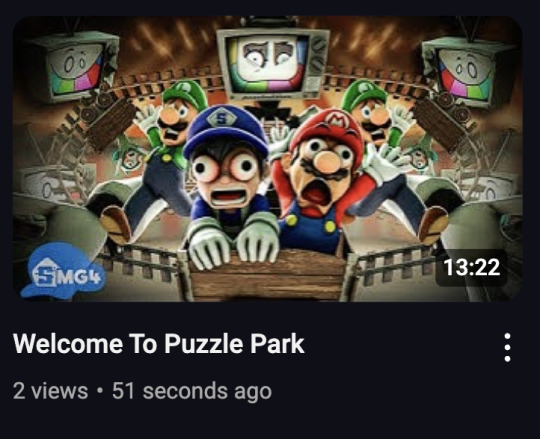
[Spoilers below cut]
I'm absolutely terrified, it's not even funny. I can't even click it. But I have to... for the LOREEEEEEEEE... okay, let's-a go....
(The following is my live reaction:)
ay the TADC plug, of course
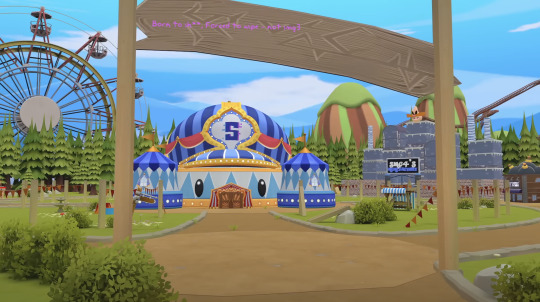
"Born to shit, Forced to wipe" - not smg3
wise words Three
also, the Ferris Wheel and rollercoaster thing is still there in the background (Ferris Wheel wedding, my beloved...)
I knew someone was going to bring up Meggy and her disappearance
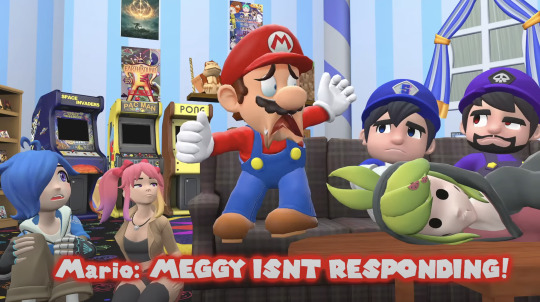
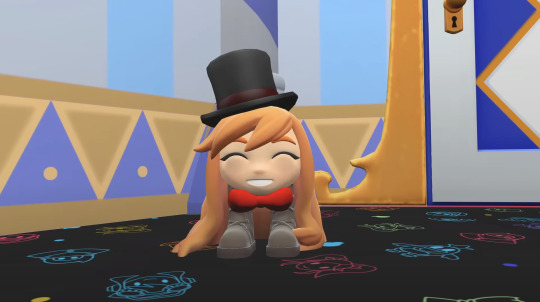
LEGGY! MEGGY, WE'LL RESCUE YOU I PROMISE!!!
THANK YOU THREE for asking the right questions here
oh... not what I expected. at least the crew knows this is obviously Mr Puzzles
NAME DROP
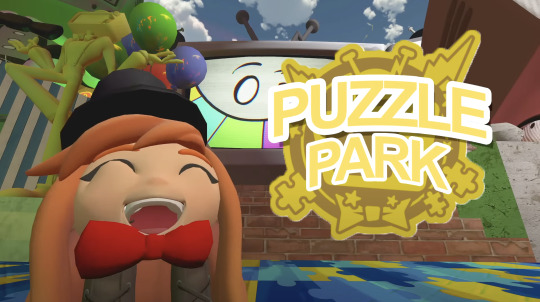
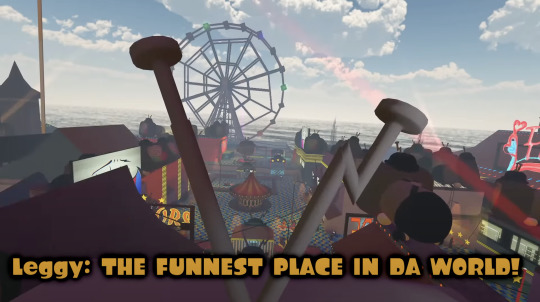
OK, a LOT to digest here:
These are all the possible minigames that we might see in WOTFI. Well, at least all the attractions we could see...
a Mr Puzzles Chonk plush (in the bottom right)
a Tunnel of Love attraction... hmmmm.......
Huh, I didn't know this was by the coast of the Mushroom Kingdom. Or it could be an island/peninsula.
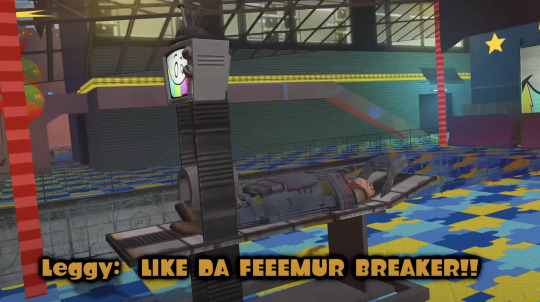
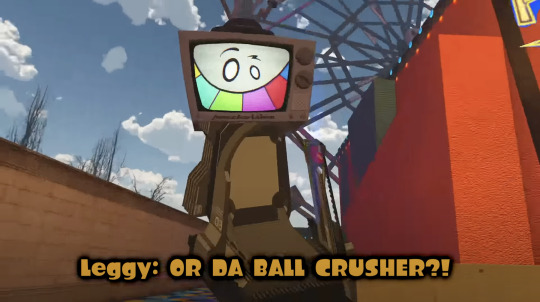
The what now, Leggy?
YEP I knew that once they found out, they would want to leave
...and of course, Mario wants to stay
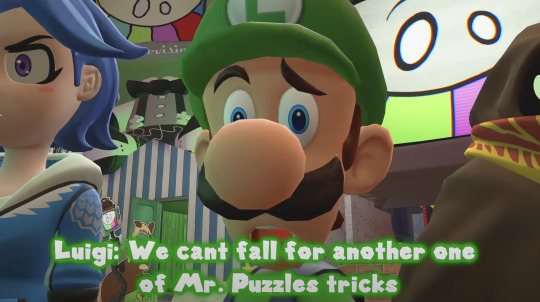
Yeah, Luigi said it himself
but also, look at the Mr Puzzles cardboard cutout in the back, he's wearing Meggy's cowboy hat from Western Spaghetti
Alright, but before we go in, we gotta have a buddy system, guys
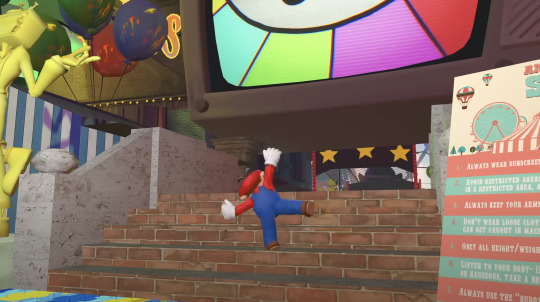
All these critiques are going to make Mr Puzzles lose himself even more than he already is
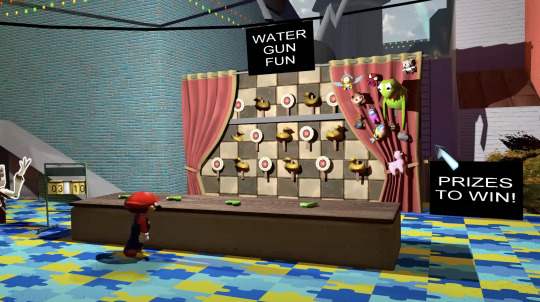
I think I saw someone posted about submitting a water gun game so congrats for getting in!
Leggy Plush!!
also spider-man plush... symbiote... venom... GOOP!4????
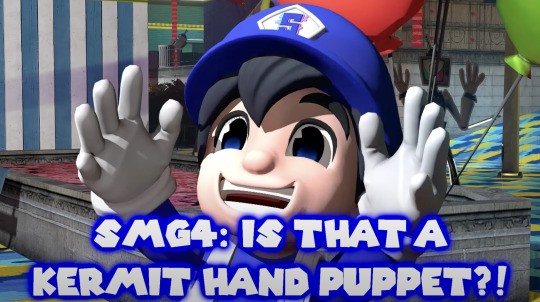
...Once Upon A Perfect SMG4?
[*points at Four and Mario*] The sillies
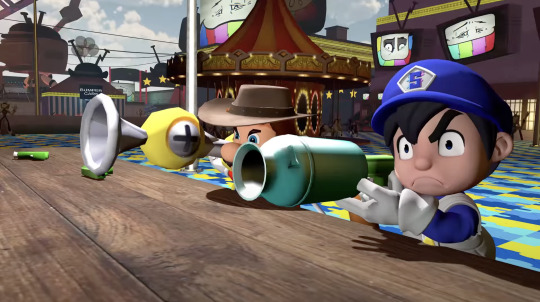
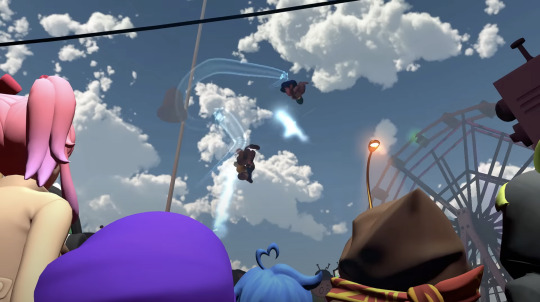
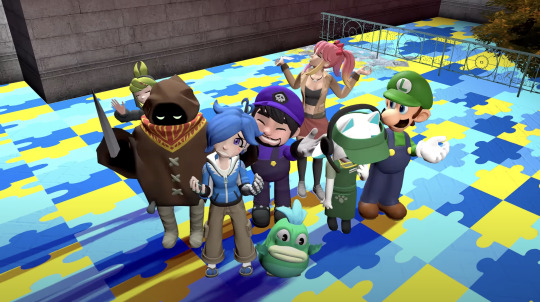
ok, but like, why is Three smiling like that while everyone else looks so disappointed?
They did the buddy system!
Bob: "Those dumbasses will see ANYTHING and get excited."
I feel seen and I don't like it.
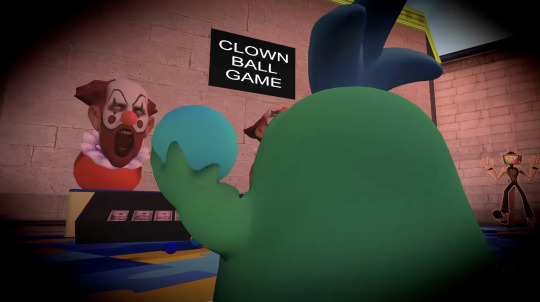
I don't like this either. I already know this is a trap but like noooooo
Three just standing there like a dad watching over his kid
Someone else also submitted a mini-game involving a ducky fishing game
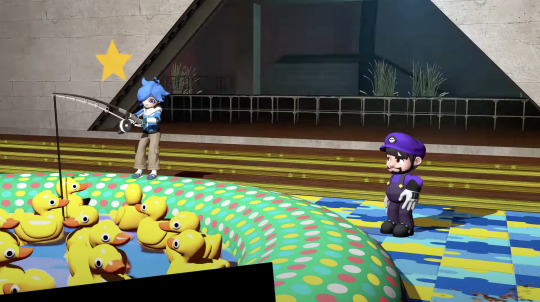
GOD DAYUM.... why did you have to pose like that, Three? You're not beating the allegations, huh.
Aw, Three really wanted to enjoy a carnival if Mr Puzzles wasn't involved (writers, write that down + carnival dates)
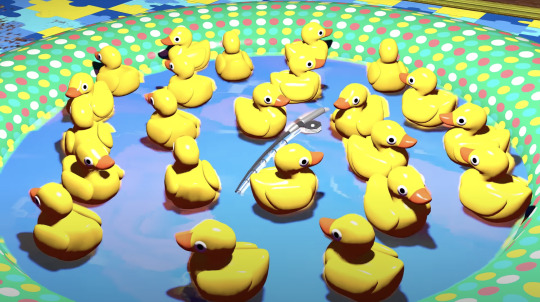
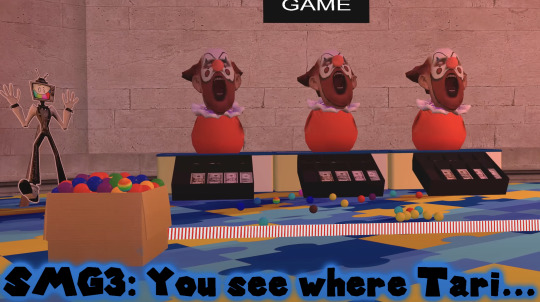
OK NOPE WE NEED TO GET OUT OF HERE NOW
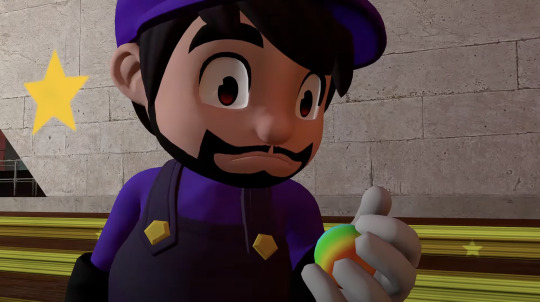
🫵 🏳️🌈⁉️
oh c'mon now, it's just plainly obvious. Not that it should be surprising, everyone's part of the skittle squad (tm)
STRONG WOMEN we love to see it

...that can't be a real thing... can it?
same Luigi same
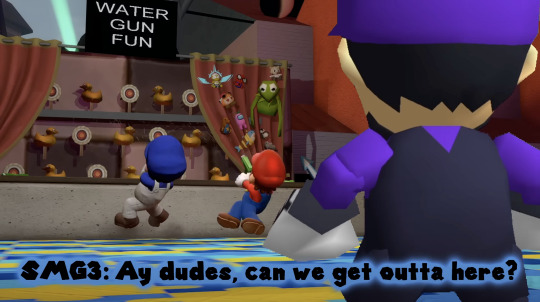
YES PLEASE CAN WE?
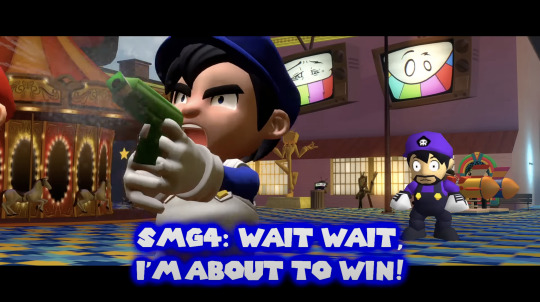
sorry dude, they really locked in
also what the hell is that building in the back?
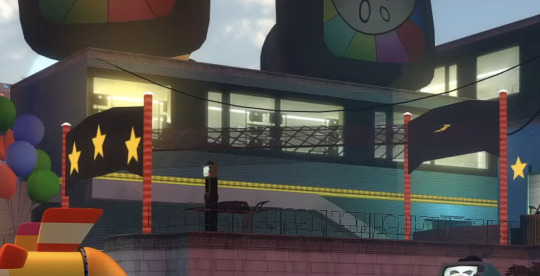
Luigi (or rather the SMG4 fandom): "See? I can handle this! I'm not afraid anymore! Do you hear me? I'm not afraid-" [*horror jumpscare*] [*scream*]
NOT EVEN MELONY'S GOD POWERS COULD HELP US, WE'RE FUCKED
NOOOOOO NOT KAREN AND SAIKO
THREE WE NEED TO LEAVE NOW
NOOOOOOOO THREEEEE I THOUGHT HE WAS GOING TO BE THE LAST ONE TO MAKE IT OUT
[*sobbing*] he sent one last text to warn them :( he really does care
AND HE SENT IT TO FOUR [*head in hands*]
the contact names they have for each other.... (I'm not well)
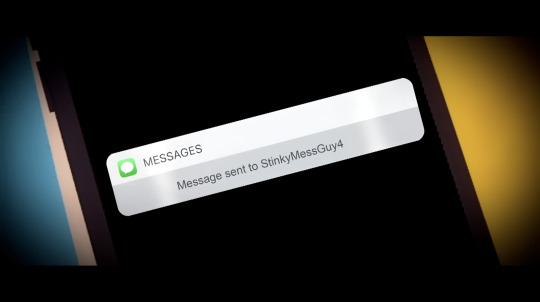
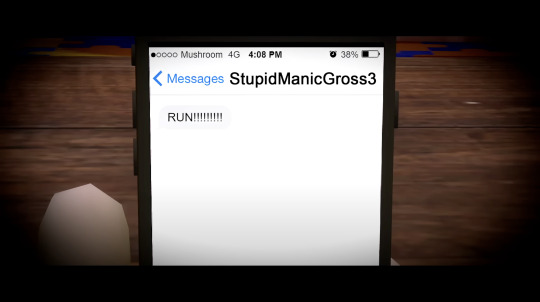
WE GOTTA GO [*runs*] GET OUT GET OUT
Leggy... why did your face change like that?
WHAT WAS THAT CRYPTIC CAPTION?!
Mario, please don't sacrifice yourself... oh, thank god! They really are having me panicking for the smallest things
wait... OMG THEY SAW MY SUBMISSION! THEY SAW IT!
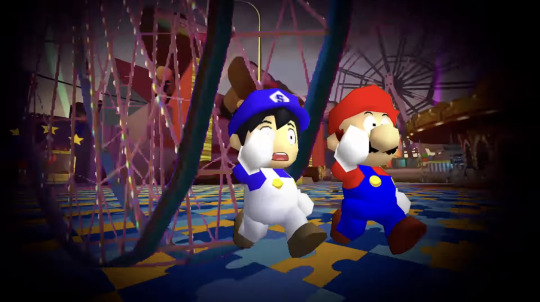
the mini-game challenge that I submitted:
Pop & Whirl: Everyone gets a bag of popcorn. The winner must keep all of their popped kernels in their bag, without dropping a single one... while being chased around the carnival by a collapsed Ferris Wheel (Professor Layton style)!
I DON'T CARE IF IT DOESN'T HAPPEN AGAIN IN WOTFI, I'LL TAKE IT. But if it does happen, I'll draw lawyer Meggy with a redesigned Ace Attorney-esque outfit (somehow)
please don't tell me the green pipe is also a trap...
...the exit door from TADC?
oh god, why does this remind me of the dark web?
and the eyes on the mushrooms... [*IGBP flashbacks*]
heh heh, funny mirrors... AH SHIT PUZZLES, DON'T JUMPSCARE ME LIKE THAT
actually, now that I think of it, Mr Puzzles hasn't revealed himself this whole time...
THE DIDNEY ENGINE ROOM?!
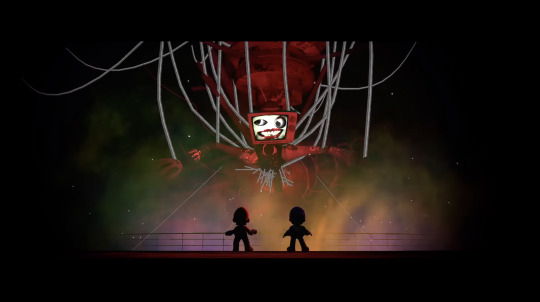
...holy shit
so was I right about us getting to see Mr Puzzles' "truest form" and the whole "Eye of Ra" thing?
are those his arms? and the circle things, it could be part of his cyborg texture but they also look like eyes.
the fog part is really interesting because they could've gone with any "spooky" color but they chose this. It's the creative vision, the one Didney had in this room.
This really reminds me of the goo from IGBP and Wren's wire simulation in Western Spaghetti, but also from this angle, a bit of Zero's "no legs" body design.
"His obsession becoming his identity" - Puzzles connected himself to the single star Didney had. You got it right, past Ink.
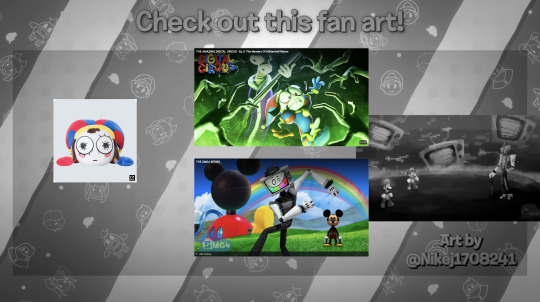
HUH?! YOU CAN'T END IT THERE
AND THEY GRAY-ED OUT OUTRO, NO MUSIC! IT'S ABOUT TO GO DOWN, GUYS
also congrats to Nikej1708241 for making it to the credits 🎉
.・-: ✧ :--: ✧ :-・.
That was a pretty solid episode ngl. Probably not as "plot twist-y"
(i know that's not a word) as the previous episode but my spaghetti gods, it delivered! Not Marty again, we may have to rethink this one.
Ok, I've made a list of all the attractions and mini-games there are in the carnival grounds in Puzzle Park:
Ferris Wheel
"Tender Tunnel" (Tunnel of Love attraction)
Merry-Go-Round carousel
Basketball arcade game
Hammer game
Bumper Cars
"House of Crazy" funhouse (also that fits Mr Puzzles somehow)
A spooky cart ride
Water gun game
Rocket ride
Arcade (just flat-out an arcade)
Clown Ball Game
(There's apparently a cafe???)
Ducky Pond fishing game
Pizza shop (....marty?)
It's probably not all of them, we would just have to wait and see, but if you submitted a mini-game that involves any of these, congrats, you likely got in!!!
I still very much enjoyed this episode and some of what I theorized could possibly come true. And some didn't, which is totally okay with me. I'll cherish the Ferris Wheel chase scene regardless :)
We still have to wait for a trailer or a special video in regards to WOTFI, which I will have to analyze and see what's to be expected. From the looks of it in this episode, it seems like it's up to SMG4 and Mario to rescue their friends one by one by completing the mini-games. The more people they rescue, the more help they can get to complete the games. And that includes saving Meggy at the end.
Now, personally, I don't want Mr Puzzles to die. Not yet. There is still a lot of potential that could go for him. A similar redemption arc just as Three went through. Puzzlevision 2. Goop!4. Marty. Anything could happen. Then again, he could die.
Now you might think he might not die because he has a plushie, but there's literally merch of Axol and Desti and they're dead. Puzzles isn't safe from this possibility.
Put in your final bets, my dear fellows, because nothing will ever be the same again...
#smg4#smg4 spoilers#wotfi 2024#smg4 wotfi#wotfi 2024 predictions#smg4 mr puzzles#ink reviews#smg34#< (there were a sprinkle of moments with them ngl)
171 notes
·
View notes
Text
Went digging through @centralohioacesandaros and I have some additional links for older* sources for the topics you’ve brought up
(*some of the blogs that haven’t been deleted were run for a while or are still running!)
Bit of everything:
Race:
Studies:
I’ve hit the link limit but I have more to add so expect another reblog on this
Asexual theory 101
Right I keep getting asked on most of my asexual posts 'What does this mean OP? Where's the sources?' so imma make a quick ace theory 101 post so if anyone says they don't get it I can say I tried. Let's go:
'What does being ace have to do with race/racism?/There's racism in the ace community???'
Pretty much everything as people of colour experience various forms of sexualisation and desexualisation at the same time, which is why POC are rarely included in asexual representation:
Asexuals of Color Still Seek to Validate Their Asexuality by Ebony Purks
Stereotypes & media about Black masculinity made it harder to come out as asexual by Tyger Songbird
Your Assumptions About Black Queer Masculinity Are Erasing My Asexual Identity by Timinepre Cole
It's Time To Start Celebrating Black Asexuality in Media By Tyger Songbird
Brown and Gray: An Asexual People of Color Zine
'What do TERFS/transphobia have to do with asexuality?'
There's a growing TERF conspiracy theory that asexuality is the side-effect of transitioning. The LGB movement believes the community is exclusively for 'same-sex attracted persons' and so identities that don't involve attraction e.g. the TQIA should be removed. Most backlash towards Yasmin Benoit, aroace activist, is from white TERFs and conservatives:
Acephobic conspiracy theories have transphobic and fascist roots by Sherronda J Brown
'But how can conservatives hate asexuality if they hate sex?'
Because they don't and never did. If the term 'puritan' was used correctly in modern internet discourse, it would be known Christian puritans believe heterosexual sex for reproduction is a gift from god and mandatory so being asexual doesn't exactly fit with that worldview. Their beef is with any form of sex and sexuality that falls outside of cis heterosexual marriage, including asexuality. They're not anti sex but anti sexual autonomy:
"Anti-Sex" and the Real Sexual Politics of the Right by Lee Cicuta (ButchAnarchy)
The religious right is now targeting sexless marriages as “selfishness.” They Want to Ban Those Too by Tyger Songbird
'What does being ace have to do with gender?'
It's commonly assumed that because patriarchy shames women's sexualities and considers all men's sexuality as biological and unavoidable, that ace women only and exclusively experience dsexualisation whilst ace men only and exclusively are pressured into being sexual beings. This can true as a broad overview but it can vary based on race, disability, class etc. This also becomes complex for asexuals that exist outside the gender binary. This is known as 'gender detachment'.
Impossible for Men, Unremarkable for Women by Canton Winer
My Work on Gender Detachment and Asexuality Strikes a Nerve by Canton Winer
'There's asexual studies now?'
Yup. On the general experiences of asexual people in the UK, including discrimination in education, the workplace and healthcare:
The National LGBT Survey (2018)
Ace in the UK Report (2023)
Specific names:
Asexual theorists: Ianna Hawkins, Michael Paramo, Julia Sondra Decker, Canton Winer (non-ace), Sherronda J Brown, Angela Chen
Asexual activists: Yasmin Benoit, Tyger Songbird, Marshall Blount (TheGentleAce), (TheAsexualGoddess)
And I'm gonna update this with more if they're worth adding. I don't wanna hear any excuses anymore or blame towards aces of colour, gay aces or trans aces for not being specific enough anymore. Read!
#meows loudly#links#the previously mentioned links from before!#I’m glad that I don’t delete sideblogs even when I rarely use them#so I can help archive things I guess
2K notes
·
View notes
Text
Asexual Muslim resistance, activism, and self care: Creating Change 2017 and me
This post is for the February Carnival of Aces.
Author note: I originally intended to write this post soon after I got back from Creating Change a month ago. However, thanks to the start of my spring term Arabic classes the week after my return, to the emotional stresses of #MuslimBan that hit right after that, and to the need to get caught up on my other responsibilities while all this was going on, it’s taken me rather longer than I expected to actually get this post out!
I attended the Creating Change conference in Philadelphia from January 18 to January 22, 2017. I had several different goals for the conference, reflecting different facets of my identity and work:
connect in person with other aces
connect in person with other queer Muslims
attend anti-racism workshops to further my volunteer work with the Muslim Anti-Racism Collaborative (MuslimARC)
attend organization building workshops relevant to the needs of MuslimARC
attend sessions on spirituality and self-care to help me in coping with burnout
The fact that I could further my interests in so many different areas of my life is why I was so excited to attend the conference. MuslimARC is not an ace or queer organization but since I have access to the resources that Creating Change offers due to my own ace and queer identity, I figured I might as well take advantage of it.
To my delight, I was able to attain all of my goals for the conference and benefit in each of these areas of my life.
Due to the way my asexuality, my being a Muslim convert, and my accessibility limitations intersect, I have difficult in connecting with groups in my local area. The Muslim spaces nearby that I am able to get to are usually not welcoming to me and not places where I fit in at all. I have been making efforts for the last several years to show up anyway because I hoped that even a flawed space would be better than nothing, which is what I have otherwise and what I had for most of the time since I converted.
Creating Change offered a chance to participate in spaces that are more inclusive of my identities. These spaces were limited - just one panel and one official gathering for each of my core identities (the ace inclusivity panel and ace caucus on the one hand and the Islamophobia panel and jumu’a prayer service on the other) - or on the margins (the unofficial ace hospitality suite and the unofficial queer Muslim caucus) but they did exist. While I could see ways these groups might fall short of providing all the support I need on an ongoing basis, within the context of the conference just the fact that they were there at all was enough.
Beyond just finding community spaces where I could meet others who share identities with me, I was able to have deep conversations with David Jay and with queer Muslim activist leaders Imam Tynan Power and Palmer Shepherd telling them my personal story and the issues I experience and even advocating for greater inclusion of asexual Muslims. The Muslim Alliance for Sexual and Gender Diversity (MASGD), which both Ty and Palmer are actively involved with, has not made any efforts so far to reach out to asexual Muslims or even acknowledge in their public materials that we exist and I emphasized to Ty and Palmer how important it is to mention aces by name because otherwise we will assume that we are not welcome. Meanwhile, I gave DJ a reference to my Asexuality and Islam website and a printout of asexual Muslim data gleaned from the ace census, so that he can amplify these resources.
The most valuable thing about these three talks was that although each group represents only half of my identity by itself, I was able to share all of myself with them. These were probably the most deeply validating experiences of the whole conference for me. And while there is still no actual asexual Muslim community (a continuing frustration of mine), I hope that my work in these conversations can help other asexual Muslims as individuals find the same validation I did.
Meanwhile, as I attended the Racial Justice Institute and a session on building sustainable funding for nonprofit organizations, I found that I was able to reference MuslimARC frequently, contribute usefully to the conversations based on my experiences volunteering there, and learn some tools and frameworks that will be useful to MuslimARC’s work. I even decided it would be useful to list MuslimARC as my organizational affiliation at future Creating Change conferences to continue building in this area. This was a pleasant surprise.
Two other workshops I attended with a racial justice focus, the Police Violence Institute and the alternatives to law enforcement session, gave me something I hadn’t expected - an insight into how Creating Change can be useful to connect ace youth, especially those from marginalized backgrounds, to LGBTQ resources that already exist to help address the larger systemic issues they face. I was able to talk with the head of an LGBTQ center in Colorado about asexuality, discover that they are already seeing ace youth seeking out their resources, and connect them with Asexual Outreach to get information and resources on asexuality. The opportunities for networking at Creating Change are amazing and next year I might print out some resources from Asexual Outreach to be able to give to people!
On the spiritual front, I made use of the Many Paths Spiritual Gathering Place as a prayer room - with five daily prayers, the logistics of being Muslim at a busy conference can be tricky and having that dedicated space out of the crowds made things a lot easier. I got to know the spiritual care team there and through the centering care workshop and the session on building an authentic spiritual path. Because of the limited space provided for Muslims specifically at the conference, and because Ty is only one person, the spiritual care team ended up providing me with a lot of support and friendship I didn’t expect to receive. Beyond this, some of the practices and ideas I gained from these sessions are things I am slowly working to implement in my life back home with links to both queer spirituality and anti-racist self-work.
Speaking of the unexpected, the conference pushed me way out of my comfort zone in multiple ways. I was initially very anxious about wearing both hijab and obvious ace gear at an LGBTQ conference where I wasn’t sure either identity would be fully welcome - but I spent five days as a very visible asexual Muslim and most people hardly blinked.
I did experience a few microaggressions, all related to being Muslim (none were related to being ace). While I was attending the Police Violence Institute a white woman acted to me in a way that I found rather tokenizing (”I’ve never seen a queer Muslim before! Can I have your business card?”) and I had to spend several minutes educating her about effective allyship (build relationships with the affected community and learn what they need you to do, then do that).
Also, at the end of the ace caucus, a white ace came up and asked me if I was a nun (yes, I consider this a microaggression). I also got this question from a random stranger while I was buying food in Reading Terminal Market one afternoon. Still, I was expecting a lot worse than this and I was really very pleasantly surprised by how unfazed most attendees were by me. Shout-out to the hijabis who have attended past conferences and paved the way for me.
Besides wearing hijab and ace gear all the time, I ended up on stage during the opening plenary session (me? shy Laura?) and even attended the lesbian caucus. I wasn’t forced to come out as anything (except as Muslim because I was wearing hijab) since there was just a large group discussion I listened to but didn’t take part in. But this was the first time I had made a public connection for myself between being homoplatonic and lesbian identity. I’m still hesitant to identify as an asexual lesbian specifically, but I took a baby step that evening and I’m proud of myself for that.
As if all this wasn’t enough, I participated in the Philadelphia Women’s March draped in an ace pride flag (and wearing an ace pride hijab) and shouting slogans like “We’re here, we’re queer, we’re fabulous, don’t fuck with us” alongside Mary and Brian, which was pretty freaking awesome. Between that and being at a session on combatting Islamophobia and then at a queer Muslim prayer service during Trump’s inauguration, I figure I put a distinctively asexual Muslim stamp on my resistance that I plan to continue.
Creating Change 2017 was a life-changing experience that for the first time brought my whole self together in a single activist space. I’m still struggling every day with burnout but this was just the self-care I needed to help me get through a very tough time.
#carnival of aces submission#resistance activism and self-care#creating change conference#creating change 2017#cc17#ace-muslim's adventures in activism
37 notes
·
View notes
Text
Carnival of Aros April 2023 Roundup Post
Well, April is over. Which means it’s time for the roundup post for this month’s Carnival of Aros! This month, I asked for submissions centered around the theme of family, what are your thoughts on it and what you feel about it. Thank you so much to all who participated. Here are this month’s submissions:
Nothing Radical: https://nothingradical.blog/2023/04/23/how-society-delegitimizes-aromantic-family/
Sara Jakša: https://sarajaksa.eu/2023/04/my-though-on-finding-a-family-carnival-of-aros/
AskAnAroAce: https://www.tumblr.com/askanaroace/715817413045813248/april-carnival-of-aros-family-afamilial
Ace Film Reviews: https://acefilmreviews.wordpress.com/2023/04/29/family-wondering-what-could-have-been/
Rachel: https://docs.google.com/document/d/1_zHaZQ5rAkvLN5iUcIHck64A74SUF_VL/edit?usp=sharing&ouid=109701227099189063791&rtpof=true&sd=true
Once again, thank you so much to all for participating in this month’s Carnival of Aros. I look forward to further conversations, and future Carnival of Aros events.
29 notes
·
View notes
Text
Carnival of Aros: Round-up March 2021
I would like to thank everyone who participated in the March 2021 Carnival of Aros on the theme of Intersectionality and Inclusivity. I am grateful and humbled that people took the time to share their thoughts and experiences. I learned a lot by reading about their experiences, and I hope the rest of the community can be made better by these. Below is the list of submissions.
aroaceingit (she/they) wrote about how her/their aromanticism intersects with her/their disabilities and how this can make it hard to function. She/they expresses, “it’s also very hard for me to picture any future that doesn’t have me feeling and functioning the way I do now. And for that reason, I am afraid to be alone.”
Isaac (he) at Mundo Heterogéneo discusses a couple of intersectionalities, such as cultural background, gender identity, and relationship cardinality. He ends with expressing, “What I expect from a community about its intersections is to follow the Latin proverb “primum non nocere,” first not to harm.”
Temple Dragon (they/them) wrote about disability inclusion. They describe ways in which we can improve accessibility and better include those with disabilities. As a call to action, they ask us to “Please keep access features that became widespread during the pandemic going after it’s subsided, and continue to End Ableism.”
Jason W./DerelictSpectre (he/him) shared his experiences in the aro community, specifically that of being Black (and South Asian). He ends with imploring “all nonblack aros and even other members of the LGBTQ+ community to educate themselves on black history, and remember to listen, uplift, support, and protect your fellow black members of the LGBTQ+ community.”
Mesotablar the Apathetic Echidna (she/her) discusses how US culture has been dominating aromantic spaces and how this can affect how content and resources are shaped. She leaves us with some good questions: “What of the people making discoveries now? people from countries where the framework is not yet established? Will they see these resources as International or American?“
bedlaminthebigtop Part 1 writes about how essential intersectionality is, how POC are an integral part of the community, and that we need to stop conflating the aromantic community with being Western and White. “To all white aro people/organisations: Stop upholding whiteness as the default. That's not a real default, that's all you. It's manufactured. It's white supremacist. Stop making your activism and your resources and your education and your teams white-centric. Stop assuming that the community is white. Stop conceptualising the target audience of aromantic community resources as white. Your whiteness is not universal.”
bedlaminthebigtop Part 2 details how amatonormativity intersects with white supremacy, specifically with regards to selective prohibition vs. promotion of marriage. The numerous ways marriage and amatonormativity are used as a white supremacist tool of oppression and coercion is discussed. “Marriage is, historically and contemporarily, a way to force BIPOC and LGBTQIA+ folks to assimilate into white bourgeois norms of monogamy and gender roles. So go on, keep fucking pretending that intersectionality is optional and marriage will save the LGBTQIA+ community.” As a last point, the absolute necessity of intersectionality is stressed.
I (graces-of-luck; she/ey) wrote about how my Latine heritage intersects with my aromanticism and express how the dominant Whiteness in the aromantic community has affected the development of my aromantic identity. “It’s been a process for me to discover what a Latine version of my aromanticism would be. I don’t know yet what that is, to be honest.” I hope for more dialogue on intimacy and relationships that are culturally diverse and for more stories from Latine aros.
CharCharChar (they/them) discussed how they are approaching making their local ace and aro group more inclusive and what concrete steps White people can take to do this. They provide some helpful resources and concludes with “Do the thing. Listen. Ask for help. Keep trying.”
Violet (she/they) wrote about how the pandemic has given her/them a lot of time to think, in which she/they questioned not only her/their gender but her/their political beliefs. She/they expressed the importance of solidarity and ended with “It’s time to stop letting our ignorance divide us.“
While there is much room for improvement, I’m inspired by the possibilities of making our aromantic community more inclusive, of lifting each other up as we experience multiple identities, and expanding the meaning and experience of what it is to be aromantic.
April’s Carnival of Aros will be hosted by Constance Bougie. The call for submissions can be found on his/their blog.
#carnival of aros#roundup#aromantic#aro#aromanticism#aros of color#aro poc#disabled aros#aro community#aro intersectionality#culture#marginalized aros#long post#gracedwithluck
92 notes
·
View notes
Text
Carnival of Aros Round-Up from October 2020: Prioritization
The October 2020 Carnival of Aros theme, “Prioritization,” hosted by @jay-aro, was a powerful one, and inspired many thoughtful responses - on the priorities of using different labels, on coming out, on using different community spaces, on getting married, and more. However, a roundup of all the submissions was never collected. Though I was not the host of that month’s Carnival, I thought it was a shame to see so many great entries languish, so here they are rounded up together for the first time.
🌿 🌿 🌿 🌿 🌿
Michelle (Quiet ‘n’ Queer): Why identifying as aromantic is important to me (as a 36-year-old woman)
As I get older, it’s my aromanticism that makes me feel queer in the world. My peers, siblings and cousins are coupling up and settling down, and here I remain, steadfastly single.
Allos (menacingaro): COA 10/2020: Identity Prioritization
As someone who prioritizes my aromantic identity over any part of my sexual orientation and sometimes my own gender mayhem, I often find myself in some level of… I wouldn’t say conflict as much as I would say difference from most of the rest of the lgbtq+/queer circles I interact with.
Coyote (theacetheist): Not a Priority
This post, too, is about priorities, but to be more specific, it’s largely a post about deprioritizing. It’s post about my decision to deprioritize the romantic orientation model, and it’s a post about quoiromantic aces like me being deprioritized by a community that likes to claim us, and it’s a post about why getting hitched (as in married) is a logistical priority for me in way that has nothing to do with what gets prioritized in aro community discourse. It’s about politics and it’s about financial insecurity and it’s about the thought of dying. It’s about saying, and being, not a priority.
Kate (venatrixlunaris): Being Asked to Prioritize
I can't "prioritize" one orientation, my aromanticism or asexuality, over each other; that's not how I understand my own experience. And finding spaces like PillowFort and the ace blogosphere that don't ask me to, that give me the space to figure out how to talk about it, has been liberating. I have yet to find any aro spaces that allow me the same feeling of freedom to be my whole self.
HM (drivingthesehillsaway): Carnival of aros submission: October 2020
I’ve only had this label for a few months, but it’s so important to me. When I first discovered that I was asexual, I inhaled all the content I could find. But when I discovered that I was aromantic, I was running out of content very quickly.
aro-and-ace-memes-thoughts: Carnival of Aros October 2020: prioritization
Shifting my prioritization to aromanticism and engaging more with the aromantic community was very positive to me. The main focus on the aro community isn’t much “having sex without romance” (or like, isn’t comparable to the alloace focus on the ace community), but more the fact that we have few or no crushes, that is what we all have in common.
Sennkestra (nextstepcake): Identification For Whose Sake
In particular, my relationship with aromanticism is complicated by the fact that I prioritize my aromantic identity in community and activism work largely for the sake of others, and only secondarily for myself.
CharCharChar (charcharcharace): Internalized Arophobia: Be Nice
I realized prioritizing aromanticism (and becoming happier by shaking off my internalized arophobia) was something I wanted to do - but not yet. Self-growth isn't a race. There isn't a cut off date.
Briar Fenrirsbur (keeperofmykeys): Deprioritization
While I can find words to label my experience of romantic attraction and sexual attraction (and I have been able to use varioriented descriptions in the past), I don’t have a sense that my identity is split, really. I did the Questioning and the bi/pan/poly/omni ‘what am I?’ cycling when I was younger, and the simple answer is that I’m not straight.
Autumn (arias-hollow): Carnival of Aros: Prioritization
I'd say that my aromanticism has actually become increasingly important over time, as I used to be unsure if I was really aro/if knowing my romantic orientation was really important back when I only id'd as asexual, but now it's the identity I think about the most.
totakeke-mori: Carnival of aros 2020, prioritization
I think best of my aromanticism because it helped me put a word on what has always defined “me”.
🌿 🌿 🌿 🌿 🌿
If I missed yours, let me know - and be sure to check out the July 2021 Carnival of Aros prompt, “Education”!
29 notes
·
View notes
Note
Hi! I'm trying to figure out if I'm on the asexual spectrum and I don't know who to talk to. Can you help me?
At the end of the day, the orientation labels you use are your choice and yours alone. Reading about other people's experiences and choices may help, but other people cannot (and should not) prescribe you an identity. Generally, if you are continuously vibing with descriptions of other people's sexuality, then it might be that you share that sexuality/orientation. There will always be a few people - maybe many people - who use your orientation label that you do not feel closely connected to, and that's absolutely fine. Basically, if the label feels right, then you are free to use it and engage with that community, and there is nothing wrong with moving on if it starts to feel like a bad fit.
Some resources for you to consider are: the carnival of aros and the carnival of aces, in which people discuss many of their personal experiences with the identities, and some of the resources on our site. There are also a variety of forum spaces out there and a solid ace and aro presence on most social media platforms, so engaging with the social media spaces you are comfortable with may be helpful.
Carnival of Aces, archives and recent ones: https://asexualagenda.wordpress.com/a-carnival-of-aces-masterpost/
Carnival of Aros: https://carnivalofaros.wordpress.com/2021/06/04/june-2021-call-for-submissions-pride-and-solidarity/
TAAAP's Site: http://taaap.org/, I recommend the Creating Change presentations under our Projects tab and anything under Learn
Also sorry for the delay in responding to asks, the amazing (/sarcasm) site that is Tumblr didn't give us notifications until an ask we received yesterday, we will be slowly working through the ask box!
31 notes
·
View notes
Text
Carnival of Aces, April 2022: 200 Words
Reposted from my blog post here (but here to share this around a bit more, so do share, if you'd like)!
Hey all–I’m hosting the Carnival of Aces again this month! For more information on this project (or to volunteer to host it), see its masterpost here. In short: I’ll propose a prompt for conversation, and those interested in responding to it can do so. At the end of the month, I’ll put together a post that links to everything submitted.
Submissions can be anything I can link to in a blog like this one: other blog posts, images (drawings, edits, etc.), videos, creative writing (poetry, drama, etc.), music/sound files, whatever. Comment below with links to what you’d like to submit, or email me at [email protected]! (If you’d like me to post your response for you–whether because you’d like it to be anonymous or for another reason–email me your submission, and I can post it here.) You can find last month’s call for subs here and its roundup post here. The topic was asexuality and law!
This post is also on Twitter here if you'd like to share it around!
April topic: 200 words
This topic’s less of a theme and more a structure thing, but I’ve been finding it to be an interesting/helpful writing exercise, so adapting it for this month’s topic! For this month’s topic, write exactly 200 words. Write about anything you’d like (related at least tangentially to asexuality)! There are a few prompts in the section below this one, though, in case you’re looking for more specific ideas.
The goal here is to see what happens when you’re made to condense everything you’re trying to say into a smaller space–what words best describe what you’re trying to say? It’s kind of fun to just write 200ish words and then go back and revise them–usually revisions are kind of a pain, but they can feel more approachable when it’s just 200 words.
As an example (and some further thoughts on this prompt), see the paragraph below! (I wrote it back in November.)
If I intend to write something only 200 words in length, what will I delete when I revise? I already don’t like the end of that first sentence; there’s a spot. (Deleted the beginning instead.) I don’t have a plan here. It’s technically fall break for me now, but I’ve got things due yesterday to finish first. What’s something smart to say here? How would Judith Butler summarize Gender Trouble in 200 words? 200 is a tight squeeze, but it feels so approachable. It’s hard to get my students into revision; I don’t do it enough myself—200 feels revisable, though; I can see it all at once. What could you do with that in a classroom? What would you discuss changing? If my students and I each wrote 200 words of something, we’d have 4000—I haven’t seen published work like that, but it’d be badass as shit. Could we all get published together? How could I facilitate that activity so that my own creative decisions didn’t take priority over those of my students? What would I offer as prompt? I like the idea of us writing one by one, responding to the 200 above our own blank space, asking questions.
Some prompts
A few questions/prompts/words/works in case one of these sparks your fancy:
Roleplaying games like Dungeons & Dragons
Kinship networks
Dr. Kim Tallbear on Reviving Kinship and Sexual Abundance (1 hour podcast episode)
Asexual time
Evil plans
Your favorite book
An ace character
Ends of semesters
Charts, graphs, tables, databases
Crafting
Asexual tarot
Hope this post finds you well! Ulysses
5 notes
·
View notes
Text
Carnival of Aros February 2021: Relationship Anarchy
Howdy y’all, I’m Allos, and I figured that February might be a good time to have the aro blogging community discuss the concept of Relationship Anarchy in relationship to aromanticism and amatonormativity. For more on the Carinval of Aros, check out the official WordPress.
As a primer, "The short instructional manifesto for relationship anarchy” written by Andie Nordgren may be helpful for those of you seeking out a description for relationship anarchy from an anarchist’s perspective. I am also interested in other people’s feelings about how relationship anarchy can be used to reorient how we view our interpersonal dynamics, regardless of how we personally code them (with new vocabulary or not) or how our societies code their significance.
To clarify, relationship anarchy is not specifically about welcoming polyamory into our lives. In my opinion, it’s more about how we value our interpersonal dynamics (whether they are romantic, platonic, familial, etc) and deconstructing the social hierarchy that amatonormativity constructs for us about how we “should” think about them (though if you have differing thoughts, it’s worth discussing imo!).
Some guiding prompts:
If there’s a part of the manifesto above that speaks to you or that you want to discuss at-depth, feel free to do so.
Vocabulary is a fairly fundamental part of how most human beings view themselves and their relationships to the world around them. How does vocabulary about interpersonal dynamics or relationships impact how you interact with them, and how would your understanding of relationship anarchy change that?
How does the framework of relationship anarchy fit within the context of fighting amatonormativity, which is a common sentiment I’ve seen around lots of aromantic-centric spaces?
As an aromantic, how could, or would, you utilize a framework like relationship anarchy in an ideal version of the world that catered to your specific interpersonal desires?
There’s been criticism of relationship anarchy being used as a scapegoat for terrible behavior in interpersonal dynamics, as well as its lack of practicality due to vagueness. In these complexities, what do you feel is worth, or not worth, considering when it comes to relationship anarchy?
The above two links are in response to when A Big Mean Lesbean hosted the Carnival of Aces in November 2016 on relationship anarchy. If anything in those posts resonates with you, feel free to discuss that as well.
Much gratitude to previous aspec discussion on relationship anarchy, and particularly towards Carnival of Aces in November 2016. I’m hoping for similar discussions.
To submit your thoughts, you can either message them to me here on Tumblr, or you can send your links to the email zhizhu @/ protonmail (dot) com, and I’ll collect them into a blog post at the end of February. If you would like your thoughts/comments anonymized, feel free to message or email me and we can arrange something, most likely hosted on this Tumblr. Deadline for submissions will be 9AM MST on March 1st.
Happy writing!
73 notes
·
View notes
Text
Being “Older” But a “Younger” Aro
This is my submission for December’s Carnival of Aros, “Getting Older” hosted by roboticanary! As an aside, the Carnival of Aros doesn’t get many submitters or hosters and could use more love, so if you’re aro, please think about joining in!
.
[Edit after I’ve finished: this is a very stream of consciousness piece, so I hope it makes enough sense!]
Though I feel old and weighed down by the world, I’m not really that old. But in the queer community, especially newer communities like the aro or nonbinary community, we tend to label people as “elders” really young. It helps that these communities are seemingly more online than off, where a lot of teenagers and young adults are. And when you discovered such an identity as a teenager and got to grow up with and watch the community evolve for a decade or so, you can easily feel like some sort of elder in the community.
With the aro community, I’m kinda of feeling the opposite. Though I’m 31 and have been involved in the ace community since I was a teenager (back when the aro community was still pretty firmly a subset of the ace community and hadn’t really managed to establish its own, separate community spaces yet - though there was a firm line that aromanticism was a different identity than asexuality), I wasn’t always aro.
I am caedromantic. I used to identify as pan/biromantic until trauma (abuse) ended up cutting my romantic attraction away.
Though even this happened pretty young (began exploring calling myself caedromantic around 21/22), my journey into the aromantic community as an aro rather than an ally was pretty slow. Though aspecs have always been welcoming, there is stigma against being aspec due to outside factors like trauma, and for a long time, this caused me to feel more like an invader than a member of the aromantic community.
For a long time, I felt oddly split down the middle. I preferred to simplify and ID as most others to aromantic rather than specifically caedromantic for ease and privacy. But a part of me couldn’t help feel like I was co-opting the aromantic identity. There are, after all, a lot of common aromantic experiences that I can’t really relate to.
Being asexual certainly meant I never related to my allo peers growing up. And I was both asexual and what one might think of as a “late bloomer” - at least compared to my peers. I knew around 10/11 that I was different from my peers when they started calling celebrities (and sometimes classmates) “hot”, the word dripping with a feeling I couldn’t name or understand but knew was something I could not relate to. For a long time, I thought of myself as having a “nothingness” because I was lacking something everyone around me seemed to have. But I didn’t have to come head to head with being asexual until I was around 16 or so and actually started having romantic crushes (of which, I couldn’t understand wtf I was feeling because I still knew it wasn’t the same as what my peers all felt, until I found AVEN and the word for people like me).
Still, though. Even being on the outskirts of my allo peers, that was an asexual experience. Not an aromantic one. I still eventually developed crushes. I know what romantic attraction feels like. The world of romance, though I’ve never been a strongly romantic person in personality, is not a stranger to me. I know what it’s like, so that sense of confusion and otherness that other aros grew up with isn’t something I can relate to. I always feel like I don’t belong when these conversations come up, even though it’s now been a decade or so since I experienced any romantic attraction, feelings, or inclinations.
Thus I rather waded into the aromantic community as compared to boldly diving into it, as I had with the asexual community.
But, the more time passes, the more my aromanticism settles on me, and the more I want to be a part of the community and show my pride. So, over time, I’ve gotten more involved. I ran (maybe will pick up again?) an aro/ace ask blog. I started following aro bloggers and creators. I spent time on Arocalypse. I volunteer for both AUREA and the Carnival of Aros now.
Which is how I’ve ended up being an “older” aro but a community “young’un”.
I started writing this post with my relationship to the aro community in mind, but now that I’m wrapping this up, I realize it’s also about my aro identity as a whole, and how I’ve accepted it more and more as I age. It’s easier to be a part of community when you can accept that you have a place there, and that claiming space, you are adding to the community - not detracting or stealing from it.
Thank you to all the aros who helped me along this journey, even just by staunchly being yourselves (or struggling to be yourself but being honest and vulnerable about it and showing me that I’m not alone). I hope that as I continue to age and grow, I can provide this sort of example and support to aros of any age coming to realize they are aro and/or trying to come to terms with being aro.
10 notes
·
View notes
Text
Everything's Gonna Be Okay's asexual representation
Everything’s Gonna Be Okay’s asexual representation
This is a submission for the April 2022 Carnival of Aces, which had a prompt of “200 words”. The Call for Submissions is here. I’d been considering watching Everything’s Gonna Be Okay ever since I saw autistic activists on Twitter sharing a scene from the series in March 2020, explaining it finally had the authentic autistic representation they craved, unlike Netflix’s Atypical. In January…

View On WordPress
#ace#Asexuality#autism#autistic#Carnival of Aces#Everything&039;s Gonna Be Okay#representation#romance#shipping
2 notes
·
View notes
Text
Get Out Of It
[This is a submission for the August 2020 Carnival of Aces, and has been cross-posted from Pillowfort.]
When I first saw the topic of what I hope to get out of the ace community, I sort of brushed it off. I, personally, don't want to get anything out of the community. I've already gotten what I came for. There isn't really anything else left for me to get out of it.
But then I re-read the prompt and realized that the think I want most from the ace community is to get out of it.
I don't mean that I'm leaving.
I don't mean that I'm trapped and looking for an escape.
What I mean is that I'd like to see things progress to a point where I can say "Looks like you all have this covered", and feel like I can step away and not leave a hole.
I recognize how self-important and arrogant that sounds, but that's not how I mean it. I mean that right now, there are so few ace activists that every last one of us is of critical importance, and when any of us leave, it's an immeasurable loss.
I think about all the voices who've disappeared or faded over my time here. I think about how much more we could have accomplished had they still been around, had our ranks been building and growing, instead of facing slow, inevitable attrition.
One of the subprompts for this Carnival is "What are new activists doing that you think is working or not working?" To that, I ask, "What new activists?" Wherever I look, the people I see doing things, the prominent voices -- they've all been doing the same thing for years now. Where are the new people putting their stamp on the community?
I see energy and innovation and new people taking the helm to explore the uncharted waters of the aro world, but virtual stagnation on the ace side.
But at the same time, the asexual community is thriving as it never has before. Meetup groups are on the rise, almost every social media platform has an ace presence, people know our flag. It doesn't feel like we're invisible anymore. The main reason I got into ace activism is because I didn't want anyone else to have to wait until they were 31 to discover that they're asexual. It sort of feels like that's been accomplished. It seems like pretty much everyone's going to hear about it by the end of high school now.
In a way, that makes ace activism obsolete. For years, the primary drive has been visibility. Shouting "WE EXIST!" as loud as we can until someone hears us.
Okay. They've heard us. What now?
Um... How about fighting singlism, pushing for better mental and physical healthcare, tearing down compulsory sexuality, inclusion in anti-discrimination policies, more and better media representation, sociological research that's not mind-numbingly out of touch and doesn't involve strapping electrodes to genitals, normalizing different models of relationships, building community locally and regionally and nationally, getting rid of the scare quotes in the DSM (getting rid of HSDD and the "I" in SI/AD from the DSM...? getting rid of the DSM...?), more and stronger advocacy groups and closer ties/direct involvement with general queer groups, reaching all the people who are long past high school and feel lost and broken and confused because they haven't heard of asexuality yet, and that's just the beginning.
Ace activism isn't obsolete, it's just at an inflection point. We're far from done.
We need to promote these sorts of things as the entrypoint to ace activism, not what you do when you get jaded and burned out after you've made your twenty-seventh Ace 101 infographic. We need to refocus the collective concept of what ace activism means to start driving these things forward.
We need more organized teams doing things and more communication between these teams. And by that, I don't just mean that we have projects with more than one person involved, I mean that the team is intentional and roles are filled by people who can do the work. Pull in a graphic designer to do the graphic design, get someone who works in the healthcare field to help navigate that world, get a PR person to be the face of the project.
We need to identify what's standing in the way of success and work on tackling those problems. Can you change the world, but need $500 to get you started? Great, let's get that money for you. Do you have a great idea but absolutely no social skills to inspire people to make it happen? Great, here's a project manager who'll handle the people for you.
We need to encourage people to get involved, because nothing will happen without them. We need to encourage people to try, because nothing will happen if we don't give it a shot.
Some of you are already doing this work and have been for years. But we need more people doing it. We need new people doing it. Bottom line, we need more people doing more things. And I have no idea how to make that happen.
And until then, I'm stuck here.
172 notes
·
View notes
Text
carnival of aros october 2020: prioritization
carnival of aros is a blogging event for aromantic (spec) people that's hosted around a different theme every month. this month i’m hosting it and the theme is “prioritization”— specifically, prioritization of identity.
for a personal example, i’m aromantic asexual but i very much prioritize my aronticism over my asexuality, to a point where even my gender identity (which is a hot mess unbeknownst to me) is something i prioritize over my asexuality. meanwhile, i see aroaces who almost entirely prioritize their ace identity over their aro— the complete opposite of me!
not to mention, there’s an even wider diversity of feelings and prioritization when you take into account all flavors of aros— aroallos, non sam aros, and just plain old aros (and previously mentioned aroaces). so for this month’s carnival, i thought it would be interesting to hear people’s reflections on what their labels mean to them.
lastly, this prompt can also be extended to other parts of identity like race, religion, etc (although orientation and gender are the intended focuses)
here are some example prompts to give you ideas! (none of these are required to answer)
how important is aromanticism to you?
do you have a different orientation you prioritize over your aromanticism? what about gender identity?
do you use the split attraction model? does your identity feel split between romantic and sexual attraction or not?
if activism is something you’re interested in, how does your aromanticism play into that? is aro activism something you focus on or are interested in?
if you’re on the aromantic spectrum, how does that impact your identity? do you ever use the label “aromantic”, or just your arospec label?
how entwined is your orientation and gender?
hypothetically, if you could only choose one label to come out as, what would you choose?
to submit your entry: if you have a tumblr, post your entry under the #carnival of aros tag and dm it to this blog. if you don’t have a tumblr, put the link to your post in the comments of the call for submissions article on the carnival of aros blog [link pending] (also, if you have my discord, feel free to send your entry in a discord dm to me)
the due date is 11:59 october 31st but i will be taking entries until november 6 at the latest
69 notes
·
View notes
Note
I feel like this is a weird request but do you have any names recs that sound like they could be or are a poison? Masc or unisex preferably thank you!!
oh my land im so sorry this has taken so long, school is absolutely holding me by the scruff of my neck and swinging me around like one of those carnival swing rides where you go 50 feet in the air
alder, ricin, toxin (on the nose i know), bastien, bellamy, morde, lux(ander), reuvan, ignatius, cyril, bones (im sorry ghdhd), lenox, ace(tine/tin/tyn), ethane (like methane?), fentan, viridium/viridian, xyol, florian, aster, hexan, ivan, larkin, bane, hemlock, henbane, altis(s)
side note: try experimenting with spellings or nicknames! my name avie was originally 'ave' (ah-vey) because i liked the word agave like agave nectar
im sorry, these were hard ghdhdhd but thanks so much for submission !! i hope these help <3
-mod avie
#lgbtcafe#order up!#requests open#name recs#name recommendations#name recommendation#masc names#unisex name#lgbt#queer#mod avie
6 notes
·
View notes
Note
Maybe a bit of a weird question but do you happen to know a post or article that talks about the way being aspec affects gender
There’s this Carnival of Aros roundup on “Aromanticism and Gender” (including my own submission). My aromanticism definitely intersects or influences with my gender more than my asexuality, but I’d be lying if I said my asexuality had no bearing on my gender whatsoever.
For myself and some other aces, the way that expectations of performative allosexuality intersect with gender roles and ideas of gender can be alienating, and Sally Vinter of Aces Wild is currently writing some comics about gender and asexuality that touch on this.
I got a series of asks (Part 1, Part 2, Part 3, Part 4) from an anon who now identifies as aroacegender.
Followers/rebloggers, feel free to add more.
#ask#anon#original#discussion#aspec#aro#ace#aromantic#asexual#nonbinary#enby#transgender#trans#gender#queer#lgbtq#Anonymous
38 notes
·
View notes
Text
Carnival of aros submission: October 2020
This is my first one of these. I don’t think I even knew these were a thing until I found this one, but I thought it’d be interesting to partake in.
I personally prioritize my aromanticism over my asexuality. I feel more confident in my label of aromantic and I feel more connected to that label. I currently identify as aroace, I guess technically using the split attraction model (?), but I have thought about how if I wanted to id as non-sam, it would be non-sam aro. I feel like for me, the two go together and mesh together, even though I discovered them separately. I haven’t put much thought into sam vs non-sam for myself. And maybe one day I will decide to label as non-sam aro, but for now it’s still aroace.
I’ve only had this label for a few months, but it’s so important to me. When I first discovered that I was asexual, I inhaled all the content I could find. But when I discovered that I was aromantic, I was running out of content very quickly. This made me sad because I felt more connected to aromanticism and wanted to explore my new label, but it felt like when I searched “aromantic,” half of what I found was just for asexuals. It feels hard to actively seek out aromantic content; I feel like I find better stuff by chance sometimes. I follow some great aro blogs though so I’ve been seeing some great content lately!
I honestly couldn’t imagine coming out as one and not the other though. I can’t imagine not having them together for me. I wouldn’t want to tell someone that I’m aro without saying that I also don’t experience sexual attraction; and I wouldn’t want to tell someone I was ace without also saying I don’t experience romantic attraction. I feel like aro may be harder for some people though because I do have an ex-boyfriend. Currently, I have three friends that I’m out to as aroace, but that’s it. I don’t know if I’ll ever come out to my family because they are fairly homophobic and don’t like lgbtqia+ stuff and I don’t know how they’d react if they knew I identified as part of that community. I will probably only come out to them if I feel I need to.
15 notes
·
View notes